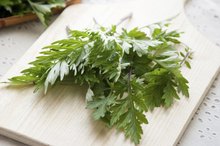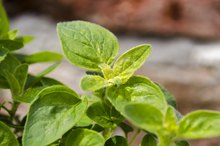What Are the Health Benefits of Absinthe?
Absinthe, or wormwood, has been used medicinally since ancient times but is more commonly known as an additive in certain alcoholic drinks, such as vermouth and absinthe 2. However, absinthe was associated with cases of serious toxicity and was banned from many places in the early 1900s. Wormwood’s medicinal use continues today, but there is insufficient scientific information to support its efficacy for any use 2. Consult with your physician before using wormwood medicinally 2.
Identification and Dosage
Wormwood is also commonly known as absinthium, absinthites, armoise and wermut, among other names 2. It is available as an essential oil and in pill, tincture and liquid extract dosage forms. Presently, there is insufficient scientific information on which to base dosing recommendations. However, Drugs.com reports that typical doses to treat heartburn are 3 to 5 g daily as the infusion or 2 to 3 g per day in herb formulations 2.
Preparation
What are the Side Effects of the Wormwood Herb
Learn More
Wormwood tea is made by adding 1/2 to 1 tsp 2. of the herb to 1 cup of boiling water, then steeping for 10 to 15 minutes. Tea is typically taken in doses of 3 cups a day. Wormwood tincture is prepared by adding 10 to 20 drops in water and taken 10 to 15 minutes before each meal 2. Wormwood tea and tincture should not be taken continuously for more than four weeks, states PaloAltoMedicalFoundation.org 12.
Benefits
Wormwood contains strong bitters called absinthin and anabsinthin, which act to stimulate the digestive tract by enhancing saliva, stomach acid and digestive enzyme production 2. Wormwood is also used as a bitter to possibly treat low stomach acidity 2. Other early research has shown wormwood to be potentially beneficial for treating intestinal parasitic worm infections 2.
Considerations
Peppermint Oil Vs. Peppermint Extract
Learn More
Wormwood oil contains two poisonous substances called thujone and isothujone 2. Thujone can cause:
- a condition called absinthism
- which manifests as addiction
- gastrointestinal ailments
- hallucinations
- seizures
- brain damage
- psychiatric problems--including suicide--warns Drugs.com 2
Avoid oil or alcoholic beverages made with the oil containing thujone. Thujone-free extract is now available and commonly used as a flavoring, mostly in vermouth and other alcoholic drinks. Wormwood should be avoided during pregnancy and breast-feeding 2.
- Wormwood oil contains two poisonous substances called thujone and isothujone 2.
- Wormwood should be avoided during pregnancy and breast-feeding 2.
Related Articles
References
- PaloAltoMedicalFoundation.org: Wormwood
- Drugs.com: Wormwood
- Holleran G, Scaldaferri F, Gasbarrini A, Currò D. Herbal medicinal products for inflammatory bowel disease: A focus on those assessed in double-blind randomised controlled trials. Phytother Res. 2020;34(1):77-93. doi:10.1002/ptr.6517
- Omer B, Krebs S, Omer LM, Noor TO. Immune modulation by wormwood (Artemisia absinthium) – results of a double blind, placebo controlled trial on Crohn's disease patients. Planta Med 2007;73-P_007. doi:10.1055/s-2007-986789
- Krebs S, Omer TN, Omer B. Wormwood (Artemisia absinthium) suppresses tumour necrosis factor alpha and accelerates healing in patients with Crohn's disease - A controlled clinical trial. Phytomedicine. 2010;17(5):305-9. doi:10.1016/j.phymed.2009.10.013
- Beshay EVN. Therapeutic efficacy of Artemisia absinthium against Hymenolepis nana: in vitro and in vivo studies in comparison with the anthelmintic praziquantel. J Helminthol. 2018;92(3):298-308. doi:10.1017/s0022149x17000529
- Elfawal MA, Towler MJ, Reich NG, Golenbock D, Weathers PJ, Rich SM. Dried whole plant Artemisia annua as an antimalarial therapy. PLoS One. 2012;7(12):e52746. doi:10.1371/journal.pone.0052746
- Weathers PJ, Towler M, Hassanali A, Lutgen P, Engeu PO. Dried-leaf Artemisia annua: A practical malaria therapeutic for developing countries? World J Pharmacol. 2014;3(4):39-55. doi:10.5497/wjp.v3.i4.39
- Almario CV, Ballal ML, Chey WD, Nordstrom C, Khanna D, Spiegel BMR. Burden of gastrointestinal symptoms in the United States: Results of a nationally representative survey of over 71,000 Americans. Am J Gastroenterol. 2018;113(11):1701-1710. doi:10.1038/s41395-018-0256-8
- Mcmullen MK, Whitehouse JM, Whitton PA, Towell A. Bitter tastants alter gastric-phase postprandial haemodynamics. J Ethnopharmacol. 2014;154(3):719-27. doi:10.1016/j.jep.2014.04.041
- Mcmullen MK, Whitehouse JM, Towell A. Bitters: Time for a New Paradigm. Evid Based Complement Alternat Med. 2015;2015:670504.
- Stebbings S, Beattie E, Mcnamara D, Hunt S. A pilot randomized, placebo-controlled clinical trial to investigate the efficacy and safety of an extract of Artemisia annua administered over 12 weeks, for managing pain, stiffness, and functional limitation associated with osteoarthritis of the hip and knee. Clin Rheumatol. 2016;35(7):1829-36. doi:10.1007/s10067-015-3110-z
- Forouzanfar F, Hosseinzadeh H. Medicinal herbs in the treatment of neuropathic pain: a review. Iran J Basic Med Sci. 2018;21(4):347-358. doi:10.22038%2FIJBMS.2018.24026.6021
- Yang M, Guo MY, Luo Y, et al. Effect of Artemisia annua extract on treating active rheumatoid arthritis: A randomized controlled trial. Chin J Integr Med. 2017;23(7):496-503. doi:10.1007/s11655-016-2650-7
- Basiri Z, Zeraati F, Esna-ashari F, et al. Topical Effects of Artemisia Absinthium Ointment and Liniment in Comparison with Piroxicam Gel in Patients with Knee Joint Osteoarthritis: A Randomized Double-Blind Controlled Trial. Iran J Med Sci. 2017;42(6):524-531.
- Hijazi AM, Salhab AS. Effects of Artemisia monosperma ethanolic leaves extract on implantation, mid-term abortion and parturition of pregnant rats. J Ethnopharmacol. 2010;128(2):446-51. doi:10.1016/j.jep.2010.01.030
- Lachenmeier DW. Wormwood (Artemisia absinthium L.)--a curious plant with both neurotoxic and neuroprotective properties?. J Ethnopharmacol. 2010;131(1):224-7. doi:10.1016/j.jep.2010.05.062
- Açıkgöz SK, Açıkgöz E. Gastrointestinal bleeding secondary to interaction of Artemisia absinthium with warfarin. Drug Metabol Drug Interact. 2013;28(3):187-9. doi:10.1515/dmdi-2013-0021
- Brown AC. Kidney toxicity related to herbs and dietary supplements: Online table of case reports. Part 3 of 5 series. Food Chem Toxicol. 2017;107(Pt A):502-519. doi:10.1016/j.fct.2016.07.024
Resources
Writer Bio
Diana Kaniecki has been writing health-related articles since 1991. Her work has appeared in peer-reviewed health journals including the "American Journal of Cardiology," "Chest" and "Pharmacoeconomics." She also develops health technology products for wellness and chronic illness self-management. Kaniecki received her Doctor of Clinical Pharmacy from St. Johns University.








